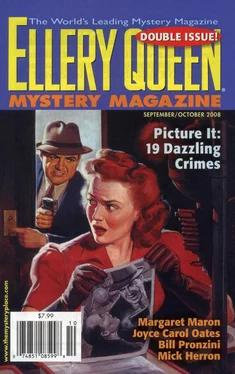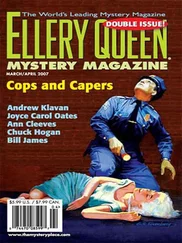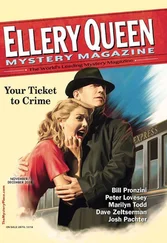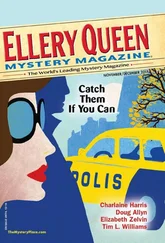Robert Barnard - Ellery Queen's Mystery Magazine. Vol. 133, No. 3 & 4. Whole No. 805 & 806, September/October 2008
Здесь есть возможность читать онлайн «Robert Barnard - Ellery Queen's Mystery Magazine. Vol. 133, No. 3 & 4. Whole No. 805 & 806, September/October 2008» весь текст электронной книги совершенно бесплатно (целиком полную версию без сокращений). В некоторых случаях можно слушать аудио, скачать через торрент в формате fb2 и присутствует краткое содержание. Город: New York, Год выпуска: 2008, ISBN: 2008, Издательство: Dell Magazines, Жанр: Детектив, на английском языке. Описание произведения, (предисловие) а так же отзывы посетителей доступны на портале библиотеки ЛибКат.
- Название:Ellery Queen's Mystery Magazine. Vol. 133, No. 3 & 4. Whole No. 805 & 806, September/October 2008
- Автор:
- Издательство:Dell Magazines
- Жанр:
- Год:2008
- Город:New York
- ISBN:ISSN 0013-6328
- Рейтинг книги:4 / 5. Голосов: 1
-
Избранное:Добавить в избранное
- Отзывы:
-
Ваша оценка:
- 80
- 1
- 2
- 3
- 4
- 5
Ellery Queen's Mystery Magazine. Vol. 133, No. 3 & 4. Whole No. 805 & 806, September/October 2008: краткое содержание, описание и аннотация
Предлагаем к чтению аннотацию, описание, краткое содержание или предисловие (зависит от того, что написал сам автор книги «Ellery Queen's Mystery Magazine. Vol. 133, No. 3 & 4. Whole No. 805 & 806, September/October 2008»). Если вы не нашли необходимую информацию о книге — напишите в комментариях, мы постараемся отыскать её.
Ellery Queen's Mystery Magazine. Vol. 133, No. 3 & 4. Whole No. 805 & 806, September/October 2008 — читать онлайн бесплатно полную книгу (весь текст) целиком
Ниже представлен текст книги, разбитый по страницам. Система сохранения места последней прочитанной страницы, позволяет с удобством читать онлайн бесплатно книгу «Ellery Queen's Mystery Magazine. Vol. 133, No. 3 & 4. Whole No. 805 & 806, September/October 2008», без необходимости каждый раз заново искать на чём Вы остановились. Поставьте закладку, и сможете в любой момент перейти на страницу, на которой закончили чтение.
Интервал:
Закладка:
“Are you with Scotland Yard?” the other boy, Rawdon Wickern, asked.
“Yes.”
Rawdon was preoccupied with tying knots into lengths of twine, reading the instructions from a Boy Scout manual. He was as well spoken as his brother. “Have you come to look for the schoolmaster?”
“Yes, I have.”
“May we see your identification?” Richard asked.
Quayle obliged.
Richard took the inspector’s badge, and the two boys examined it with forensic interest.
The Wickern boys were dressed alike in tailored outfits. They were children, but with their manner and tone of speaking — daggers dipped in honey — they were like two miniature Edwardian gentlemen.
“Where were you born, Inspector Ian Edward Quayle? ” Richard asked.
“London.”
“Shouldn’t you be fighting in the war?” Rawdon asked.
“I’m too old for that.”
“How old are you?”
“Sixty-six.”
“We’re fourteen. We’re twins.”
“Did you fight in the Great War?” Richard asked.
Quayle nodded. “I was a sergeant.”
Richard passed the identification back. “Have you met our father?”
“No, I haven’t.”
“Our father works at the War Office.”
“He’s very important,” Rawdon added.
“So I understand.”
Richard leant back in his chair and stared indifferently at the inspector. “We don’t know where Black has gone.” His pronunciation of the schoolmaster’s name was with such distinctive sharpness, it almost carved the word into two syllables.
“What kind of man was he?” Quayle asked. He lit a cigarette.
Young Margaret motioned to speak, but then thought better of it. The housemaid couldn’t have been much older than the two boys, a tiny thing with a face of freckles.
The five of them — Quayle, Standish, Mrs. Chalmers, Margaret, and Joseph the stableboy — were seated at the dinner table in the servants’ hall. Supper had been polished off, and coffee was being drunk. The Wickern boys had been fed earlier, upstairs in the dining room, and had been seen off to bed.
Joseph the stableboy had said nothing throughout the supper. He was a peculiar boy of eighteen. His eyes never appeared to focus on anything, and his face seemed to be permanently on the verge of a smile.
“The schoolmaster was always reading,” Mrs. Chalmers commented. “He always had a book in his hand.” She licked her fingertip and dabbed up the remaining crumbs from the breadboard. “I couldn’t begin to think what’s happened to him.”
Standish lit his pipe. “Maybe the man got what he deserved.”
“What is that supposed to mean?”
“I’m just saying.” Standish stubbed out his match in an ashtray. “I never did like the man.”
“Why didn’t you like him?” Quayle asked.
The groundsman’s face crinkled up into a scowl. “He was a bit toffee, for a servant. He spoke with an accent like he was one of them upstairs.”
“So, he was well spoken and well dressed,” the housekeeper said. “That’s no reason to wish ill of him.”
Standish shook his head. “If you ask me, you’re wasting your time.” He glanced across the table at the inspector. “The man’s cleared off. It’s as plain as the moustache under your nose.”
“We heard something,” young Margaret finally said.
“What did you hear?” Quayle asked her.
“In the night. We heard a noise. I reckon it was a gun.” She nodded with wide eyes. “It came from the south wing.”
“There’s nowt in the south wing,” Standish remarked.
Mrs. Chalmers was shaking her head. “That noise, whatever it was, had nothing to do with the schoolmaster’s disappearance. We heard that noise the night after he’d gone.”
Mallbright was freezing at night. It was after two in the morning, and Quayle was sitting upright in bed, buried under a mound of blankets and wearing a woolen nightcap. He had been billeted in the schoolmaster’s room. The bed had been made fresh the day the man had disappeared, and Mrs. Chalmers saw no good reason in opening up any other rooms, given that an empty bed already lay waiting.
Quayle examined the book lying on the bedside table. He opened it to the first page. “It was the best of times, it was the worst of times.” Dickens was one of his favorite authors. The author was also apparently one of the schoolmaster’s favorites — there was a dedication on the book’s title page. It was written in a wide hand:
The book had been read many times since that dedication. On almost every page, Black had made annotations in the margins — scholarly observations, in small, delicate handwriting.
There were footsteps. Quayle looked up. Someone was outside in the hallway. There was a faint reflection of candlelight on the shiny floorboards underneath the closed door. Someone had stopped outside his room.
Quayle listened closely. There were softly spoken voices — to whom they belonged and what they were saying he couldn’t determine. There was a click as the door handle was taken in someone’s hand. It slowly began to rotate.
“Who is it?” Quayle asked in a sharp voice.
The door handle fell limp. The reflection of candlelight vanished.
Quayle jumped out of bed. Within seconds, he had opened the door and was standing outside his room.
There was no one there. The only sound he could now hear was that of the wind rustling branches against the windowpanes at the end of the hallway.
Breakfast the next morning consisted of coffee and a cigarette. Quayle consumed it in the servant’s hall around eight. He was alone — the household staff having promptly begun their day at five-thirty. And after breakfast, he ventured to another country: the south wing.
The south wing was the oldest part of the house. It constituted the original Mallbright — the building having been steadily augmented and added to by every successive generation of Wickerns. As a result, the overall structure was that of a vast maze of mismatched rooms, passageways, and staircases.
There was a discernible stillness in the rooms of the south wing. It was as though life had taken pause there and was waiting patiently for the war to end. No one lived in that part of the house. It was dark and empty, and acres of sheets covered nearly everything in sight. There was also a distinctive mustiness — a damp odor that hung in the air in the hallways. It made Quayle’s nose itch.
“Who goes there?”
The blunt barrel of a rifle confronted the inspector. He had just turned a corner in the hallway, and Rawdon was aiming at his head.
“What is the password?” the boy demanded.
“Put that down,” Quayle barked. Rawdon was holding a .303 Lee-Enfield rifle.
“Don’t worry, Inspector,” Richard said. “It isn’t loaded.” He had come out of the darkness from behind his brother.
Rawdon lowered the rifle.
“Why are you boys playing in this part of the house?” Quayle asked. He noticed Richard was holding a similar rifle. “I thought this part of the house was closed down?”
“We’re not playing,” Richard explained. “We’re practicing. If the German army invades, we wish to be ready.” The boy then slung the strap of his rifle over his shoulder and marched back up the hall from where he had come.
Rawdon did the same, but he paused for a moment before following his brother. “He had a secret.”
“Who did?” Quayle asked.
“The schoolmaster.”
“What kind of secret?”
“A dirty secret.” The boy then about-faced and marched off like a toy solider.
Читать дальшеИнтервал:
Закладка:
Похожие книги на «Ellery Queen's Mystery Magazine. Vol. 133, No. 3 & 4. Whole No. 805 & 806, September/October 2008»
Представляем Вашему вниманию похожие книги на «Ellery Queen's Mystery Magazine. Vol. 133, No. 3 & 4. Whole No. 805 & 806, September/October 2008» списком для выбора. Мы отобрали схожую по названию и смыслу литературу в надежде предоставить читателям больше вариантов отыскать новые, интересные, ещё непрочитанные произведения.
Обсуждение, отзывы о книге «Ellery Queen's Mystery Magazine. Vol. 133, No. 3 & 4. Whole No. 805 & 806, September/October 2008» и просто собственные мнения читателей. Оставьте ваши комментарии, напишите, что Вы думаете о произведении, его смысле или главных героях. Укажите что конкретно понравилось, а что нет, и почему Вы так считаете.












